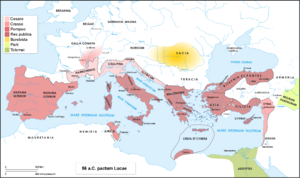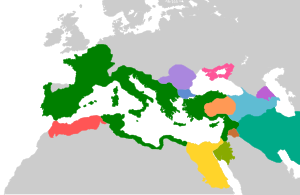Marcus Calpurnius Bibulus facts for kids
Quick facts for kids
Marcus Calpurnius Bibulus
|
|
|---|---|
| Consul of the Roman Republic | |
| In office January 59 BC – December 59 BC Serving with Julius Caesar
|
|
| Preceded by | Lucius Afranius and Quintus Caecilius Metellus Celer |
| Succeeded by | Lucius Calpurnius Piso Caesoninus and Aulus Gabinius |
| Personal details | |
| Born | c. 102 BC |
| Died | 48 BC |
| Spouses | 1 Unknown 2 Porcia |
| Children | By first wife: Marcus Calpurnius Bibulus Gaius Calpurnius Bibulus Lucius Calpurnius Bibulus Calpurnia By Porcia: (Gaius) Calpurnius Bibulus Calpurnia |
| Military service | |
| Allegiance | |
| Commands | Governor of Syria Commander of the Adriatic Fleet |
Marcus Calpurnius Bibulus (around 102 BC – 48 BC) was an important politician in the Roman Republic. He believed in traditional Roman ways and often worked alongside Julius Caesar. However, they were lifelong rivals.
In 59 BC, Bibulus became a consul, which was the highest elected office in Rome, sharing the role with Julius Caesar. Their time in office was very difficult. Caesar's supporters even attacked Bibulus in the main Roman forum. After this, Bibulus mostly stayed out of public life for the rest of his term.
Later, from 51 to 50 BC, he served as governor of Syria. He was good at his job but upset his army by taking too much credit for defeating the Parthians. In 49 BC, when Caesar's Civil War began, Bibulus joined forces with Pompey. He was put in charge of the fleet (navy) that was supposed to stop Caesar from moving his army across the Adriatic Sea. He failed to do this and also failed to cut off Caesar's supplies. While on blockade duty in 48 BC, he became sick and died.
Contents
Bibulus's Early Life and Career
Marcus Calpurnius Bibulus belonged to the plebeian Calpurnia family. This family was a powerful group in ancient Rome. It is thought he was the first in his direct family line to reach a high political office.
People described Bibulus as "serious and steady." He served as a curule aedile with Julius Caesar in 65 BC. Aediles were officials who looked after public buildings and organized festivals. They also helped keep public order. Caesar was much more popular than Bibulus during this time, especially when they organized the ludi Romani, a big religious festival.
Bibulus and Caesar also served together as praetors in 62 BC. Praetors were judges. Bibulus always tried to oppose Caesar. Around this time, Rome faced the Catiline conspiracy, a plot by some nobles to overthrow the Republic. Bibulus helped stop supporters of this rebellion in the region of Abruzzo.
Bibulus and the Roman Senate
Bibulus was a strong supporter of the boni, meaning "good men." These were traditional senators who believed the Senate should have the most power. They worried that powerful individuals like Julius Caesar were using the people's assemblies to change the state too much. Caesar was a populist, meaning he appealed directly to the common people.
Caesar decided to run for consul in 59 BC. He had the support of powerful allies, Pompey and Marcus Licinius Crassus. Becoming a consul was the highest honor in Rome. The boni, including a leader named Cato, feared Caesar. They thought he would destroy the traditional Roman way of life. Bibulus was already strongly against Caesar. He was also married to Porcia, Cato's daughter.
To stop Caesar from having too much power, the boni bribed voters heavily. They wanted to make sure Bibulus would be Caesar's co-consul. They succeeded, and Bibulus narrowly won against Caesar's chosen candidate.
Bibulus as Consul
Caesar started his time as consul by proposing a law to buy land for Pompey's soldiers. These soldiers had returned from war and needed land. The boni, led by Cato, walked out of the Senate to stop the law from being discussed. Caesar then took the law to the Centuriate Assembly, which was made up mostly of former soldiers. Many of Pompey's veterans came to Rome to vote.
Bibulus became unpopular by treating these veterans badly. He said he didn't care what they wanted. He also got three officials called plebeian tribunes to try and block the law. However, Pompey and Crassus publicly supported Caesar's law. The tribunes were afraid to use their veto (power to block a law).
Right before the vote, Bibulus tried to stop it for religious reasons. But Caesar, who was also the chief priest (pontifex maximus), ignored him. Bibulus and his tribunes tried to speak against the law, but the crowd turned on them. They broke Bibulus's fasces (symbols of his power) and pushed him down. Bibulus even dared the crowd to kill him to end his embarrassment. His fellow senators convinced him to leave, and the assembly passed the law.
The next day, Bibulus complained to the Senate about what happened. He asked them to cancel the law, but they did not. He also resisted swearing an oath to uphold the new law but eventually did. After this humiliation, in March 59 BC, Bibulus stopped attending Senate meetings. This left Caesar in complete control of the consulship.
Bibulus sometimes sent out complaints against Caesar and Pompey. This led to attacks on his house by Caesar and Pompey's supporters. For the rest of the year, people joked that the two consuls were really "Julius and Caesar." Bibulus joked back, calling Caesar the "Queen of Bithynia," hinting at a rumor about Caesar. He also claimed Caesar was involved in an earlier plot by Catiline. Bibulus spent the rest of his term at home, claiming he was watching for omens. He said this meant all laws passed that year were invalid.
Bibulus in the Senate and as Governor
Throughout the 50s BC, Bibulus continued to criticize Pompey in the Senate. He blamed Pompey for fights between political gangs. Pompey even thought Bibulus was part of a plot to kill him. Bibulus also voted against Pompey going to Egypt to help a king regain his throne.
However, by the end of the 50s BC, the boni (traditional senators) started to support Pompey. They saw him as someone who could stop Caesar's growing power. In 52 BC, Bibulus suggested that Pompey should serve as the only consul to restore order in Rome. The Senate agreed to this unusual idea.
Because of a new law, Bibulus did not become a governor right after his consulship. In 51 BC, he finally became governor of Syria. He upset the soldiers there by taking too much credit for their victories. Two years before, a Roman general named Crassus had been badly defeated by the Parthians. A commander named Gaius Cassius Longinus had saved the Roman army and later defeated the Parthians at Antioch. The army loved Longinus for this. Bibulus arrived when things were already stable. He sent a report to the Senate about his actions against the Parthians and how he organized Syria's defenses. The Senate gave Bibulus a twenty-day thanksgiving celebration.
In 50 BC, Bibulus sent two of his sons to Egypt to ask Roman soldiers there to return. But the soldiers killed his sons because they refused to leave. When Cleopatra sent the murderers to Bibulus for punishment, he sent them back. He said it was up to the Senate to punish them.
Civil War and Bibulus's Death
After his time as governor, Bibulus returned west in 49 BC. He found that civil war had started between Caesar and Pompey. Bibulus sided with Pompey. He was put in charge of Pompey's fleet in the Adriatic. His job was to stop Caesar and his troops from crossing from Brundisium in Italy to Epirus (in Greece).
Caesar had only half the ships he needed. He decided to take seven legions (large army units) across the Adriatic first. He planned for the ships to return and pick up the rest of his army. Crossing the Adriatic in winter was usually very hard. But Caesar, as chief priest, knew the calendar was wrong. He knew the weather would be better than expected. This helped Caesar, as the Adriatic was too rough for Bibulus's warships to go far from their base.
Bibulus was surprised when Caesar and his fleet successfully crossed the Adriatic on November 6th. They landed at Palaeste. Bibulus was only about 50 miles (80 km) south, but he had no scouts out, and his ships were not ready. When he heard about Caesar's crossing, he ordered his crews to sea. He sailed north, hoping to capture the ships carrying Caesar's reinforcements. He was too slow again. He only arrived as the ships were returning to Italy. He managed to capture and burn 30 of Caesar's transport ships.
Bibulus then tried to stop any more ships from crossing to supply Caesar. He only captured one more ship. This ship was carrying private citizens and had refused Bibulus's orders. In a rage, Bibulus ordered everyone on board to be killed.
Bibulus then blocked all the harbors along the coast. He hoped to stop any more crossings from Italy and leave Caesar trapped in Epirus. However, he found he couldn't resupply his own ships without leaving the blockade. He tried to trick Caesar's officers at Oricum into agreeing to a temporary truce so he could get supplies. When Bibulus refused to promise safety for Caesar's envoys (messengers) who wanted to discuss peace with Pompey, Caesar realized it was a trick and stopped talking.
Bibulus was determined to continue the blockade. He pushed himself too hard. He became sick in early 48 BC and died near Corcyra (modern Corfu) before the end of winter.
Bibulus's Family Life
Bibulus was the son of Gaius Calpurnius. He was married twice. From his first marriage, he had three sons. These included Lucius Calpurnius Bibulus, who later became a statesman. His two oldest sons, Marcus and Gaius, were killed in Egypt. They were killed by soldiers who had been left there by a general named Aulus Gabinius. Bibulus may also have had a daughter named Calpurnia. She was the first wife of a Roman senator named Marcus Valerius Messalla Corvinus.
Bibulus's second wife was Porcia, the daughter of Cato. They married sometime between 58 and 53 BC. With Porcia, he had two more children, at least one of whom was a son who lived to adulthood. The other might have been a daughter, but it is not certain. After Bibulus died, Porcia married Brutus. Brutus later became one of the main leaders in the plot to assassinate Caesar.
Sources
Ancient Texts
Modern Books
- Bringmann, Klaus, A History of the Roman Republic (2007)
- Broughton, T. Robert S., The Magistrates of the Roman Republic, Vol II (1952)
- Holland, Tom, Rubicon: The Triumph and Tragedy of the Roman Republic (2004)
- Holmes, T. Rice, The Roman Republic and the Founder of the Empire, Vol. I, II, III (1923)
- Morrell, Kit, Pompey, Cato, and the Governance of the Roman Empire (2017)
- Smith, William, Dictionary of Greek and Roman Biography and Mythology, Vol I (1867)
- Syme, Ronald, The Roman Revolution (1939)
| Political offices | ||
|---|---|---|
| Preceded by Q. Caecilius Metellus Celer |
Roman consul 59 BC With: Julius Caesar |
Succeeded by L. Calpurnius Piso Caesoninus |
See also
 In Spanish: Marco Calpurnio Bíbulo para niños
In Spanish: Marco Calpurnio Bíbulo para niños
 | James Van Der Zee |
 | Alma Thomas |
 | Ellis Wilson |
 | Margaret Taylor-Burroughs |



